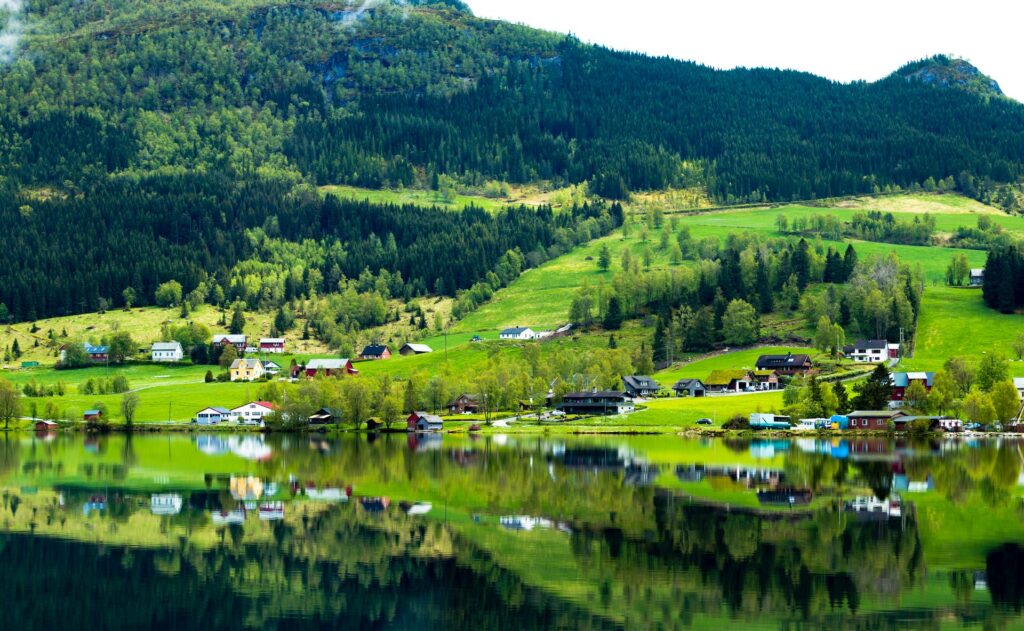Norway: A Journey Through Customs and Flavours

Norway, the land of spectacular fjords and the Northern Lights, is a land that enchants not only with its stunning natural beauty, but also with its rich cultural history and gastronomic traditions. This Nordic country offers a unique blend of age-old traditions and modernity that is reflected in its culture, cuisine, and way of life.
Norwegian History and Culture: A Fascinating Mix of Old and New
Norway is a country that has managed to preserve its ancestral traditions while adapting to modern realities. Norway’s historical heritage is deeply rooted in the Viking Age, a period that left an indelible mark on Norwegian culture.
The Vikings: Pillars of Norwegian History
The Viking Period, which spans from the 8th to the 11th century, is a major chapter in Norwegian history. These fearless navigators and warriors left their mark not only in Norway, but also in many parts of Europe, Asia, and even North America. They are known for their skill in the art of navigation, their incredible sagas, and their mythology rich in gods and heroes. Today, Vikings are celebrated at many festivals across the country, such as the Gudvangen Viking Festival, where participants can relive the Viking Age through re-enactments, craft workshops, and combat demonstrations.
Norwegian Art: Reflecting the Soul of the Country
Norwegian art has always been a reflection of the country’s culture and history. From prehistoric cave paintings to modern masterpieces, Norwegian art tells the country’s story in various forms. The painter Edvard Munch, whose work “The Scream” has gained worldwide fame, is one of the best-known Norwegian artists. His unique expressionist style has greatly influenced modern art. In addition, Norwegian architecture, with its stave churches (Stavkirke) and modern buildings such as the Oslo Opera House, is a testament to the country’s rich artistic history.
Norwegian Literature: A Mirror of Society
Norwegian literature has always been a mirror of society, reflecting the concerns, hopes and fears of its authors. From authors like Henrik Ibsen, whose plays revolutionized world theatre, to contemporary writers like Jo Nesbø, whose thrillers are translated around the world, Norwegian literature offers a variety of genres and styles. In addition, the Nobel Prize in Literature was awarded to three Norwegian writers, which is a testament to the richness and diversity of the country’s literature.
The role of music in Norwegian culture
Music has always played an important role in Norwegian culture. From traditional folk music, with its unique instruments like the Hardanger fiddle, to the contemporary music scene, which includes genres as varied as black metal and jazz, music is an essential way for Norwegians to express their cultural identity. Music festivals like the Bergen Festival and the Oslo Jazz Festival attract artists and audiences from all over the world, making Norway a must-visit destination for music lovers.
Norwegian gastronomy: A culinary journey to the heart of the Fjords
Norwegian cuisine is a reflection of its natural environment. Between mountains, forests and fjords, Norway offers an abundance of fresh produce that inspires its cuisine.
Seafood Specialities: A Treasure of the Norwegian Fjords
Norway, with its long coastline and many fjords, is famous for its seafood. Norwegian salmon is particularly well-known and is exported all over the world. It is often served smoked, gravlax (marinated salmon) or simply grilled. Torsk (cod) is another mainstay of Norwegian cuisine, traditionally prepared as a stew or dried and salted to become klippfisk, a key ingredient in bacalao. Shrimp and crabs, caught directly from the cold waters of the fjords, are also very popular.
Meat Dishes: A Legacy of Rural Life
Norwegians have a long tradition of hunting and herding, which is reflected in their meat-based dishes. Fenalår, a salted and dried leg of lamb, is a traditional dish often served on special occasions. Rakfisk, fermented fish, is another unique dish that can be a challenge for uninitiated palates. Additionally, game, such as reindeer and elk, is often used in stews and grills, offering robust, earthy flavors.
Norwegian sweets: A taste of tradition
Norway has a range of desserts and pastries that will delight sweet tooth lovers. Vafler (waffles) are a must-try, often served with berry jam or brunost, a sweet brown cheese unique to Norway. Krumkake, a rolled-up, crispy cookie, and lefse, a kind of pancake made from potatoes, are other traditional delicacies. For special occasions, Norwegians often prepare a kransekake, a ring tower of marzipan.
Norwegian Drinks: From Coffee to Aquavit
Norwegians are among the largest consumers of coffee in the world, and the drink is an important part of their daily lives. Whether it’s to start the day, for a break at work or to accompany a dessert, coffee is always there. When it comes to alcohol, aquavit, an eau-de-vie flavored with herbs and spices, is the national drink. It is often served on special occasions, such as Christmas dinners or weddings. Additionally, Norway has a thriving brewing scene, with many microbreweries producing a range of craft beers.
Norwegian Traditions: Celebrations that unite the country
In Norway, traditions are an integral part of everyday life and are celebrated with enthusiasm. Among these traditions, the celebration of “Syttende Mai”, or Constitution Day, is the most important. On this day, the whole country is decked out in red, white and blue, and parades are held in every city.
Saint Lucia’s Day, celebrated on December 13, is another important tradition. This holiday, which marks the beginning of the Christmas season, is characterized by candlelight processions and carols.
Norway, with its quaint customs and unique cuisine, is a country worth exploring. Its rich culture, fascinating history and living traditions make Norway a must-see destination for travellers in search of authenticity and discovery. So, are you ready to embark on an unforgettable journey to the heart of the Norwegian fjords?
Copyright 2023 holidaysnorway.uk

